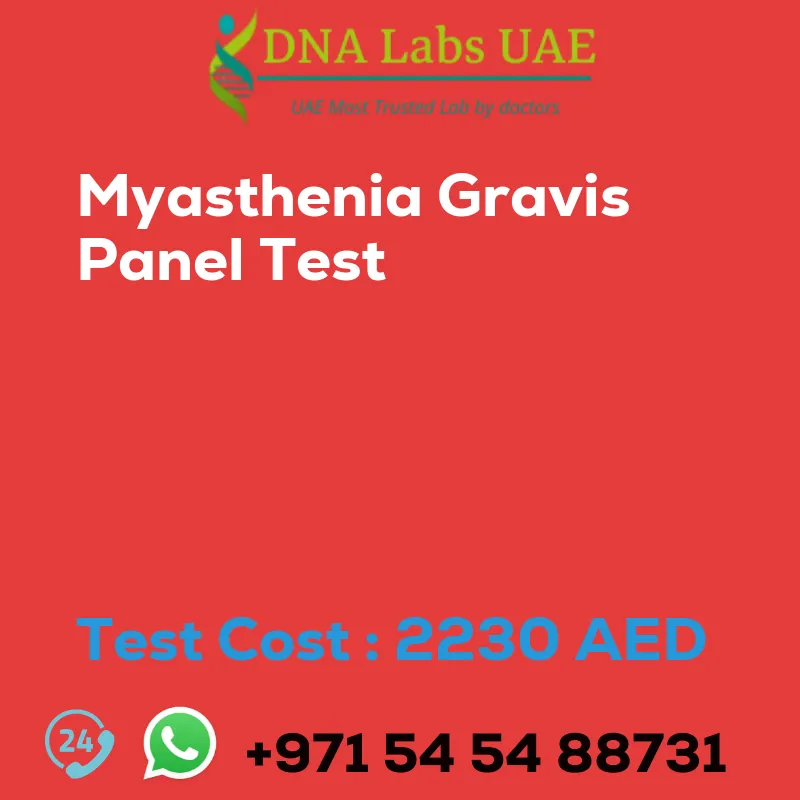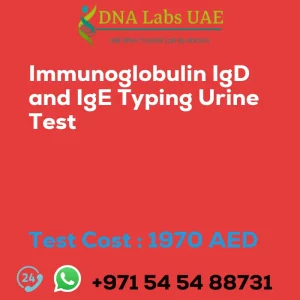MYASTHENIA GRAVIS PANEL Test
Test Name: MYASTHENIA GRAVIS PANEL Test
Components:
- Acetylcholine Receptor Binding Antibody
- Striated / Skeletal Muscle Antibody in Dilutions
- MuSK Antibody
Price: 2230.0 AED
Sample Condition: 5 mL (3 mL min.) serum from 2 SST’s. Ship refrigerated or frozen. Patient should not have general anaesthetic or muscle relaxant drugs, 24 prior to sampling.
Report Delivery: Sample Tue by 9 am; Report 4 days
Method: Radioimmunoassay, IFA
Test type: Myasthenia gravis
Doctor: Neurologist
Test Department: IMMUNOASSAY
Pre Test Information: Patient should not have general anaesthetic or muscle relaxant drugs 24 prior to sampling.
Test Details:
The Myasthenia Gravis Panel test is a group of laboratory tests that are used to help diagnose and monitor the autoimmune disorder known as Myasthenia Gravis (MG). MG is a chronic condition that affects the muscles and causes weakness and fatigue. The panel typically includes the following tests:
- Acetylcholine Receptor Antibodies (AChR): This test measures the presence of antibodies that attack the acetylcholine receptors on muscle cells. The majority of individuals with MG have these antibodies.
- Muscle-Specific Kinase Antibodies (MuSK): This test detects the presence of antibodies against muscle-specific kinase, which is another target in some cases of MG. It is especially useful for individuals who are negative for AChR antibodies.
- Striated Muscle Antibodies (Striational): This test measures the presence of antibodies that attack proteins found in the muscle cells. These antibodies are more commonly found in individuals with MG who have thymoma (a tumor of the thymus gland).
- Repetitive Nerve Stimulation (RNS): This test measures the electrical activity of the muscles by stimulating the nerves that control them. It helps to evaluate the transmission of nerve signals to the muscles and can detect abnormal muscle response, known as decremental response, which is a characteristic feature of MG.
- Single Fiber Electromyography (SFEMG): This test evaluates the electrical activity of individual muscle fibers and can detect abnormalities in neuromuscular transmission, which is often seen in MG.
The Myasthenia Gravis Panel test is typically ordered when a healthcare provider suspects MG based on the symptoms reported by the patient, such as muscle weakness and fatigue that worsen with activity and improve with rest. These tests can help confirm the diagnosis and determine the specific type of MG, which can guide treatment decisions. Additionally, they may be used to monitor the effectiveness of treatment and assess disease progression.
| Test Name | MYASTHENIA GRAVIS PANEL Test |
|---|---|
| Components | *Acetylcholine Receptor Binding Antibody *Striated / Skeletal Muscle Antibody in Dilutions *MuSK Antibody |
| Price | 2230.0 AED |
| Sample Condition | 5 mL (3 mL min.) serum from 2 SST\u0192??s. Ship refrigerated or frozen. Patient should not have general anaesthetic or muscle relaxant drugs, 24 prior to sampling. |
| Report Delivery | Sample Tue by 9 am; Report 4 days |
| Method | Radioimmunoassay, IFA |
| Test type | Myasthenia gravis |
| Doctor | Neurologist |
| Test Department: | IMMUNOASSAY |
| Pre Test Information | Patient should not have general anaesthetic or muscle relaxant drugs 24 prior to sampling. |
| Test Details |
The Myasthenia Gravis Panel test is a group of laboratory tests that are used to help diagnose and monitor the autoimmune disorder known as Myasthenia Gravis (MG). MG is a chronic condition that affects the muscles and causes weakness and fatigue. The panel typically includes the following tests: 1. Acetylcholine Receptor Antibodies (AChR): This test measures the presence of antibodies that attack the acetylcholine receptors on muscle cells. The majority of individuals with MG have these antibodies. 2. Muscle-Specific Kinase Antibodies (MuSK): This test detects the presence of antibodies against muscle-specific kinase, which is another target in some cases of MG. It is especially useful for individuals who are negative for AChR antibodies. 3. Striated Muscle Antibodies (Striational): This test measures the presence of antibodies that attack proteins found in the muscle cells. These antibodies are more commonly found in individuals with MG who have thymoma (a tumor of the thymus gland). 4. Repetitive Nerve Stimulation (RNS): This test measures the electrical activity of the muscles by stimulating the nerves that control them. It helps to evaluate the transmission of nerve signals to the muscles and can detect abnormal muscle response, known as decremental response, which is a characteristic feature of MG. 5. Single Fiber Electromyography (SFEMG): This test evaluates the electrical activity of individual muscle fibers and can detect abnormalities in neuromuscular transmission, which is often seen in MG. The Myasthenia Gravis Panel test is typically ordered when a healthcare provider suspects MG based on the symptoms reported by the patient, such as muscle weakness and fatigue that worsen with activity and improve with rest. These tests can help confirm the diagnosis and determine the specific type of MG, which can guide treatment decisions. Additionally, they may be used to monitor the effectiveness of treatment and assess disease progression. |








